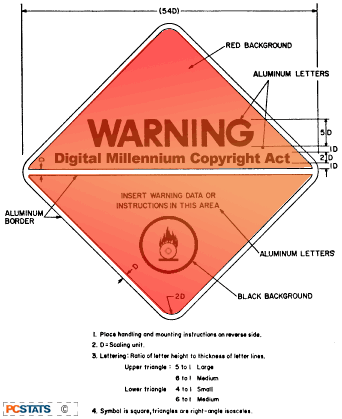Beginners Guides: Legally Copying Software and Music
A guide through the murky © maze to
help you protect your investments - without getting sued. - Version 1.0.0
We are living in the age of
mass theft, or at least that's one way to look at it. The epidemic of software
piracy and music and movie sharing is almost impossible to separate from the
influx of computer use and especially fast Internet access into our homes. The
two occurred so simultaneously that it seems amazing in retrospect that no-one
realized what was going to happen.
Human beings are social
creatures, and we do like to share what we enjoy. Of course, we are accustomed
to hoarding things that are finite and consumable, like food or money, but
files? Software? They don't run out or get used up, so human nature dictates
that we share them.
Notions of value get tossed
out the window when the product is essentially infinite. Unfortunately, the same
values and methods of selling are used for digital products as for regular ones,
and of course copyright and intellectual property rights still apply.
 The RIAA, movie production
companies and major software companies would have you believe that internet
piracy is undermining the entire system of pay entertainment, and removing the
livelihood from the creators of the products.
The RIAA, movie production
companies and major software companies would have you believe that internet
piracy is undermining the entire system of pay entertainment, and removing the
livelihood from the creators of the products.
The advocates of music
and file sharing argue that movie and music file sharing has not noticeably impacted the commercial prospects
of the respective industries. Heck, file sharing may have even helped increase CD sales
by exposing more music to more people.
Both
sides have legitimate points, but we are not going to argue them here. What we
want to look into is what you are legally allowed to do with your own
software and music
on
your computer. Given the current climate of RIAA lawsuits and piracy crackdowns
in the news, it's easy to see people getting a little worried over the handling
of their legitimate software and music on their home system.
As rather little real
information actually emerges from news soundbites, we wanted to dig a little
deeper and clear up the somewhat grey area between backing up and
retaining copies of your own software and music, and illegal or semi-legal
file sharing and duplication.
This article is not
intended to be legal advice, but rather a guideline on what you can and cannot
do with your
digital media under copyright. As such, we do not go deeply into the various legal
questions that are raised. If you want more information on your rights and
liabilities in your country, please see a solicitor. First stop,
the omnipotent Digital Millennium Copyright Act.

